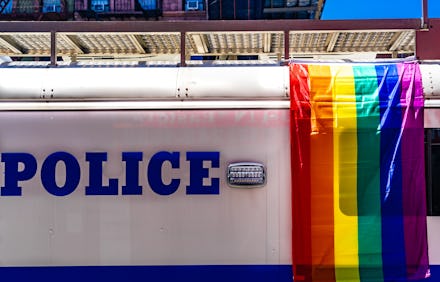NYC Pride is banning cops. Can this be the new norm?

In a return to its origins as a protest of police brutality against LGBTQ people, NYC Pride will no longer permit police to participate in its parade until 2025, the New York Times reported. This way, the LGBTQ community — especially its trans and BIPOC members — can celebrate free of the presence of police, which a press release from the organization said can be “threatening, and at times, dangerous.” Could this be the new norm?
Under the ban, police and corrections officers can’t march as a group, the Times explained, effective this year. In its press release, NYC Pride announced plans for an expanded budget that would allow them to develop “a first response emergency plan” based on private security companies and volunteers trained in de-escalation, turning to NYPD “only when absolutely necessary as mandated by city officials.” A complete ban doesn't seem likely, though, according to the Times, partly because public events are required to have some police presence for security. But basically, the ban seems to send a message that cops will be used mainly as a last resort — and they certainly won’t get to be celebrated at Pride.
The move comes after longstanding pressure from some LGBTQ activists, per the Times, who pointed to the history of Pride, which began after police raided the Stonewall Inn, a gay club in New York City, on June 28, 1969, and brutally forced people out of the establishment. Marsha P. Johnson and Sylvia Rivera, two trans women of color, led the ensuing six-day protest against police, which proved pivotal to the fight for queer liberation. The following year, a march from Stonewall Inn to Central Park marked the country’s first Pride parade.
After initially resisting calls to remove police from its events, the Times reported, NYC Pride responded to them as they grew louder in the wake of George Floyd’s murder by a Minneapolis police officer last year. The newspaper noted that the organization's decision aims to meet the needs of Black people, as well as trans and gender nonconforming people, who tend to not only be marginalized within the LGBTQ community, but also targeted by police.
Other cities have taken steps to exclude law enforcement from Pride, as well. San Francisco, Sacramento, Toronto, and London have already banned uniformed police officers from participating in the parade.
Could these be signs of a broader movement toward cop-free Pride events? In many cases, police have actually harmed the LGBTQ community they're presumably entrusted to protect. Law enforcement officers have targeted protesters at the very Pride events where they’re supposed to feel safe. LGBTQ people with certain intersecting identities are especially vulnerable: Trans people of color were six times more likely to report police violence than their white cis counterparts, according to a 2013 survey by the National Coalition of Anti-Violence Programs.
“One of the biggest issues is that there's a lot of individuals within the queer and trans community, within the people of color community, that just don't feel comfortable around the police because of their personal experiences of trauma,” Shay Lewis, a demonstrator at the 2018 Edmonton Pride parade, told the CBC.
Brian Downey, the president of the Gay Officers Action League (GOAL), criticized NYC Pride’s ban, according to the Times. “Their response to activist pressure is to take the low road by preventing their fellow community members from celebrating their identities and honoring the shared legacy of the Stonewall Riots,” he told the newspaper.
It all goes back to the flawed “bad apple" theory. Even if many law enforcement officers do support queer liberation, the fact is that policing as an institution, in its current form, remains antithetical to it — something that more and more cities have come to recognize.